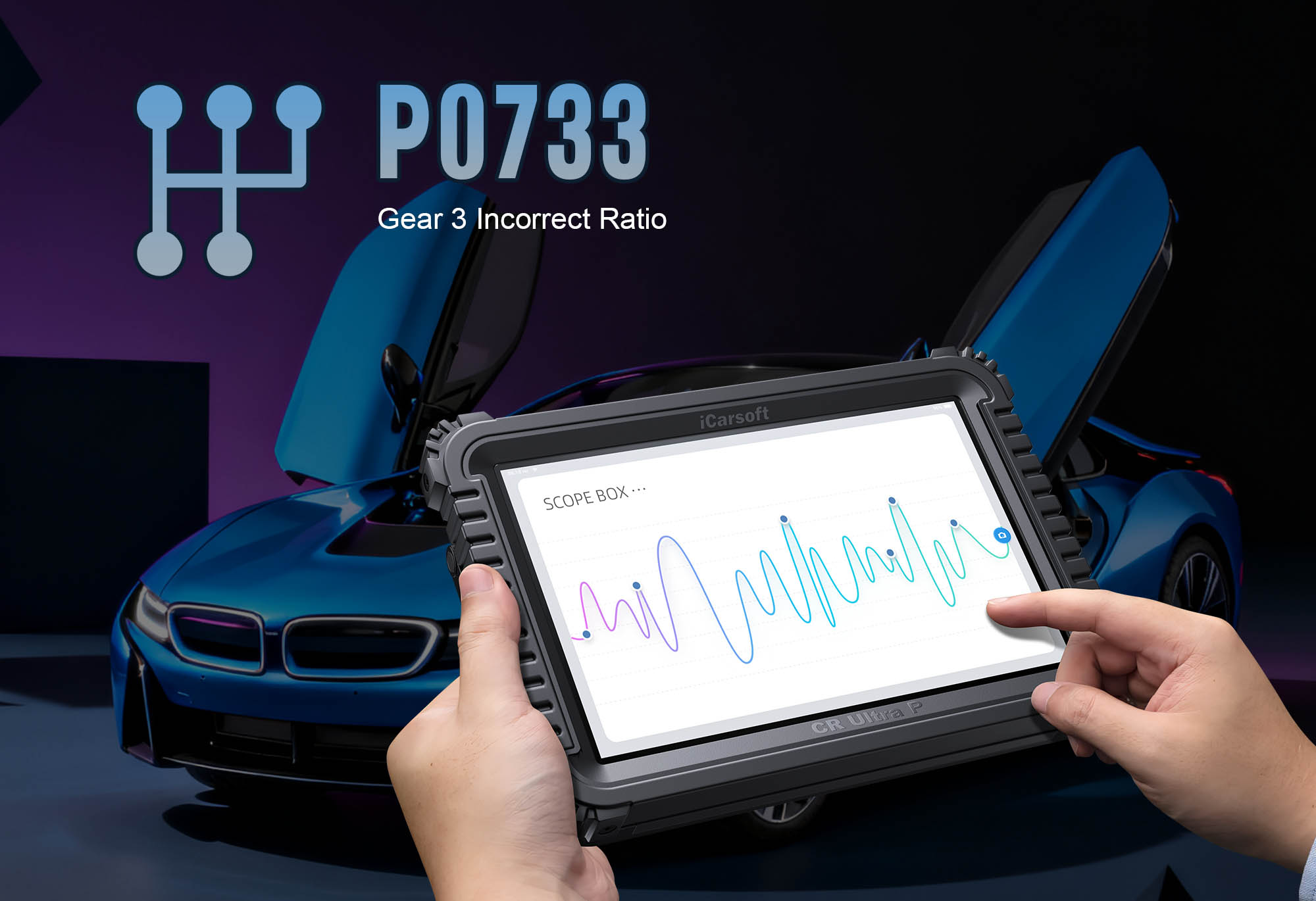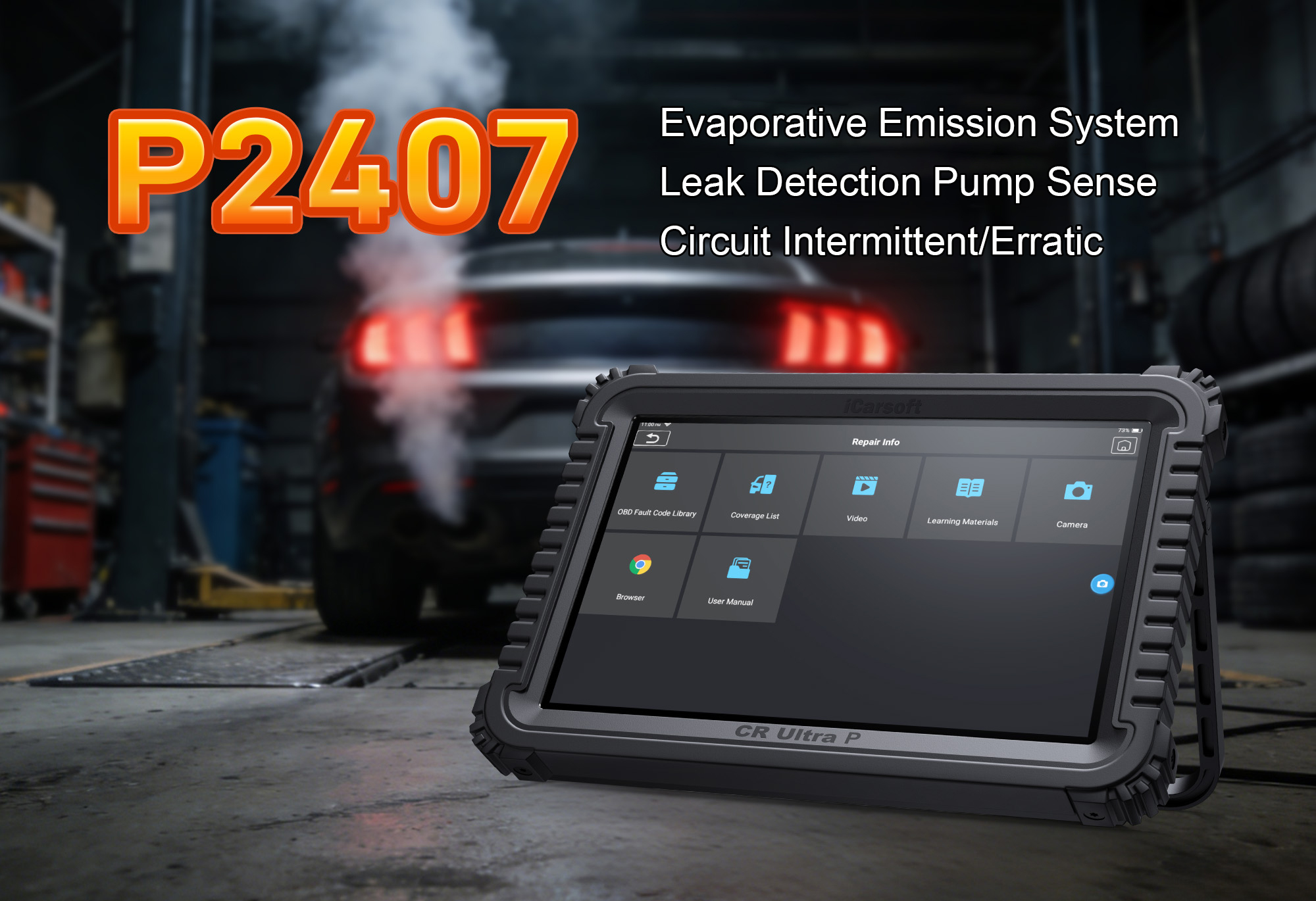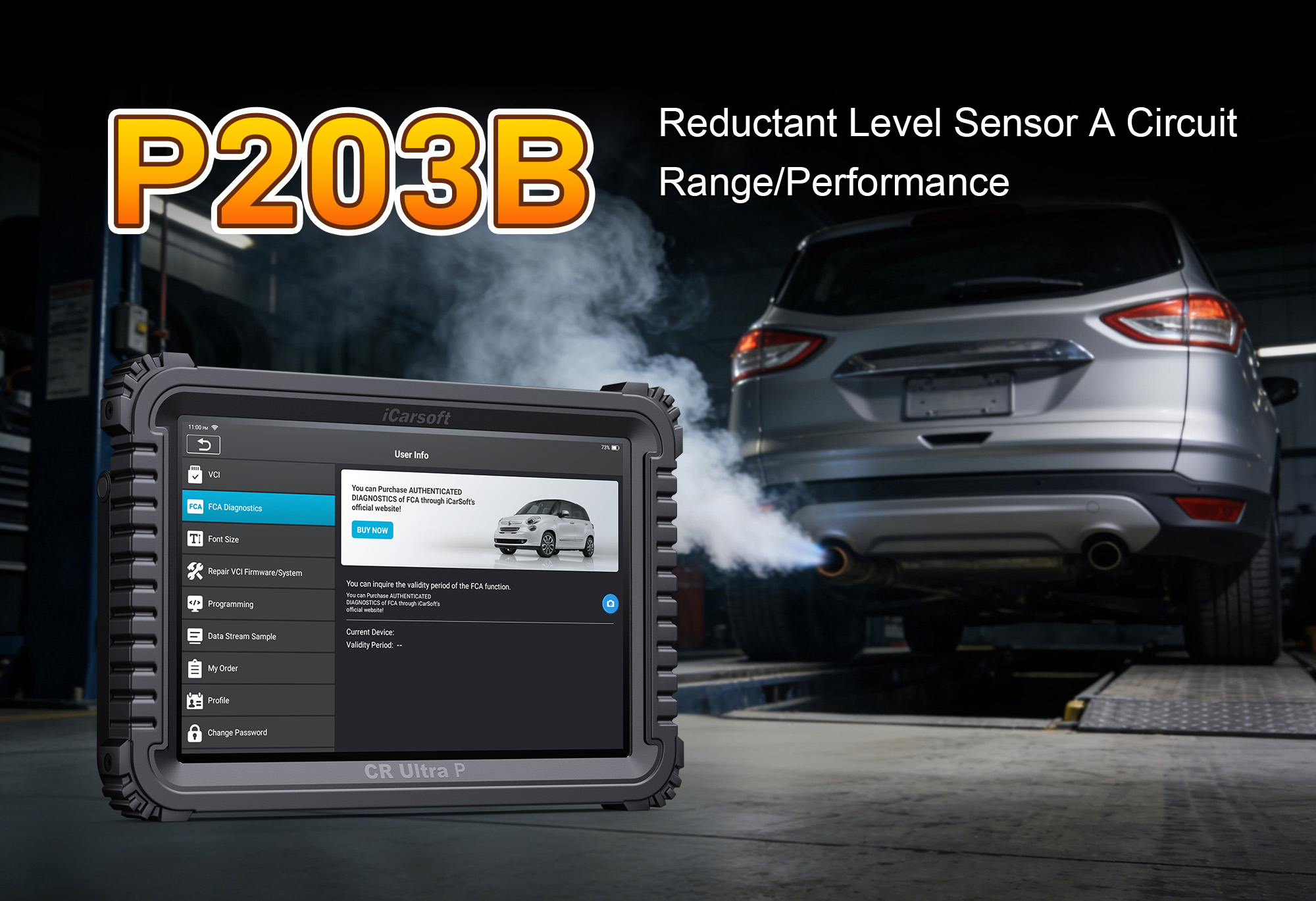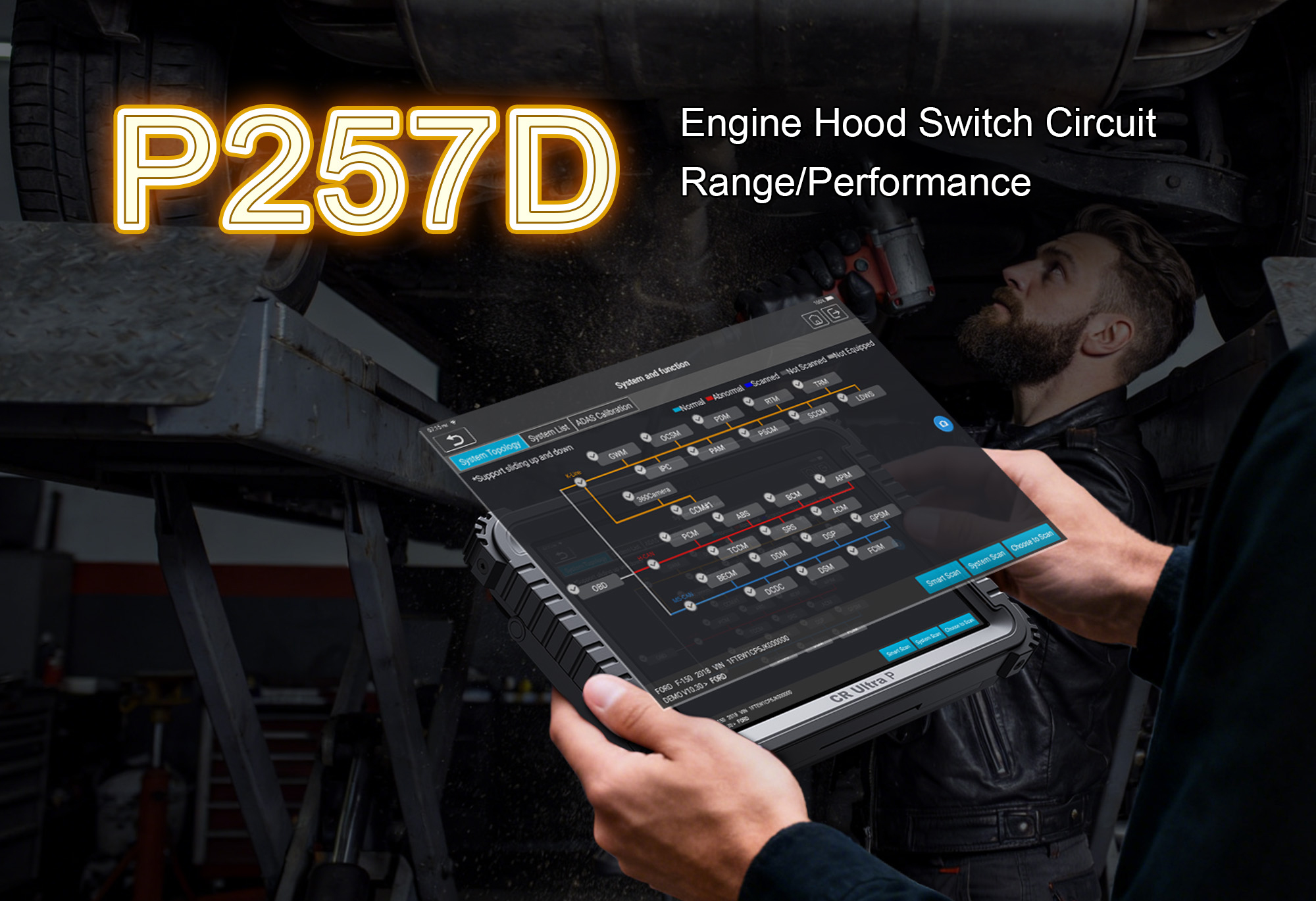Diagnose & Clear P0733 with iCarsoft CR Ultra P
If your vehicle struggles to shift into third gear, jerks during highway acceleration, or triggers a check engine light paired with transmission slippage, a diagnostic scan will likely return P0733. This OBD-II code stands for "Gear 3 Incorrect Ratio"—a critical fault indicating the transmission’s third gear is not maintaining the manufacturer-specified speed ratio between the input (engine-side) and output (wheel-side) shafts. The Transmission Control Module (TCM) relies on this ratio to ensure smooth, efficient gear engagement; when third gear deviates beyond acceptable limits (typically ±10–15%), it triggers P0733, signaling potential mechanical wear, fluid issues, or hydraulic failures.
Basic scanners might only flag a "gear ratio error" but can’t measure real-time shaft speeds, test clutch pressure, or recalibrate the TCM—leaving you guessing between worn third gear clutches, clogged valves, or sensor malfunctions. The iCarsoft CR Ultra P, with its OE-level transmission diagnostics, live ratio monitoring, and bi-directional controls, solves this. Let’s break down how to diagnose and resolve P0733 with precision, using the CR Ultra P’s unique features to restore proper third gear function and seamless highway shifting.
Understanding P0733: Causes & Key Symptoms
Automatic transmissions depend on precise hydraulic pressure, friction clutch engagement, and gear synchronization to maintain correct speed ratios. For third gear—critical for highway cruising—the TCM calculates the ratio by comparing input shaft speed (from the engine) to output shaft speed (from the wheels). A healthy third gear ratio typically ranges from 1.2:1 to 1.8:1 (varies by make/model); P0733 triggers when this ratio is too high (slipping) or too low (binding). As the fault worsens, third gear performance degrades rapidly, impacting both drivability and fuel efficiency:
Key Symptoms of P0733
-
Delayed or Hesitant Third Gear Engagement: The transmission lingers in second gear before shifting to third, or the engine revs excessively (2,500+ RPM) before the gear finally locks in.
-
Harsh Shifts to/from Third Gear: Jolts or "shudders" when accelerating into third gear (e.g., merging onto highways) or decelerating into second gear.
-
Third Gear Slippage: RPMs spike without a corresponding increase in speed (e.g., 3,000 RPM at 50 mph instead of 2,200 RPM), indicating the gear isn’t fully engaging.
-
Reduced Highway Power: The vehicle feels sluggish during third-gear acceleration (e.g., passing other cars), as power isn’t efficiently transferred to the wheels.
-
Limp Mode Activation: Severe ratio deviations force the TCM into limp mode (locks the transmission in 2nd or 4th gear) to prevent catastrophic damage, limiting speed to 40–50 mph.
Common Causes of P0733
|
Cause
|
Description
|
|
Low/Contaminated Transmission Fluid
|
Insufficient fluid reduces hydraulic pressure, preventing third gear clutches from engaging fully; dirty fluid (debris, metal shavings) clogs valves, disrupting pressure regulation.
|
|
Worn Third Gear Clutches/Bands
|
Friction material wear on third gear clutches (or stretched bands in older transmissions) causes slippage, increasing the gear ratio beyond limits.
|
|
Faulty Shift Solenoid
|
The solenoid controlling third gear (e.g., Solenoid C) fails to open/close properly, altering hydraulic pressure and preventing consistent gear engagement.
|
|
Clogged/Broken Valve Body
|
A stuck valve in the valve body blocks fluid flow to third gear, leading to inconsistent pressure and ratio errors.
|
|
Input/Output Speed Sensor Malfunction
|
Inaccurate speed signals from these sensors cause the TCM to miscalculate the third gear ratio, falsely triggering P0733.
|
Why iCarsoft CR Ultra P Excels at Diagnosing P0733
The CR Ultra P outperforms basic tools with features tailored to transmission gear ratio diagnostics—critical for resolving P0733 accurately:
OE-Level Live Ratio Monitoring
Reads real-time input/output shaft speeds, calculates live third gear ratios, and compares them to manufacturer specs—data no basic scanner provides.
Hydraulic Pressure Testing
Measures clutch pressure in third gear (where supported), identifying low pressure that causes slippage or high pressure that leads to binding.
Bi-Directional Solenoid Control
Activates third gear shift solenoids manually to test engagement, distinguishing electrical faults (solenoid) from mechanical issues (worn clutches).
Transmission Topology Mapping
Visualizes the entire third gear system (solenoids, valve body, clutches, sensors) as a color-coded diagram, highlighting pressure leaks or wiring faults.
Global Vehicle Coverage
Supports 200+ passenger vehicle brands (Ford, Toyota, BMW, Audi, etc.) and transmission types, including 2018+ models with DoIP/CAN-FD protocols.
CR Link VCI Compatibility
Seamless connectivity with modern TCMs via included VCI, unlike older tools limited to basic OBD-II.
41 Hot Service Functions
Includes fluid reset, clutch pressure calibration, and TCM adaptation relearn—essential for restoring proper third gear ratios post-repair.
Step-by-Step: Diagnose P0733 with iCarsoft CR Ultra P
-
Safety First & Initial Checks
1. Let transmission cool 2–3 hours (fluid temps exceed 250°F) to avoid burns.
2. Check fluid level & condition:
- Use Transmission > Fluid Level Check (dipstick-less) or vehicle dipstick to verify level.
- Inspect fluid: Bright red = clean; dark/cloudy/burnt = contaminated (needs flushing).
3. Locate components via Component Location > Transmission > Gear 3 System:
- Third Gear Shift Solenoid: In valve body (under transmission pan).
- Input/Output Speed Sensors: On transmission case (input near engine, output near driveshaft).
- Valve Body: Inside transmission, under the pan.
-
Connect Tool & Confirm P0733
Plug CR Ultra P into OBD-II port, pair with CR Link VCI. Select AutoVIN Identify to retrieve transmission type, third gear ratio specs (e.g., "1.5:1 ±0.15"), and solenoid details. Navigate to Transmission > Fault Codes > Read Codes to confirm P0733. Tap Code Details for vehicle-specific insights (e.g., "Honda Civic: Measured 1.8:1, Expected 1.4–1.6:1"). Note related codes (P0730, P0732) and resolve P0733 first.
-
Monitor Live Third Gear Ratios to Isolate the Fault
Navigate to Transmission > Live Data > Gear Ratios. Start engine, shift to "D," accelerate to 40–50 mph (third gear). Monitor "Gear 3 Ratio":
- Too High (> Spec +15%): Slippage (low pressure, worn clutches, solenoid issues).
- Too Low (< Spec -15%): Binding (stuck valve, excessive pressure, mechanical obstruction).
Compare to manufacturer specs displayed in Code Details.
-
Test Solenoids, Pressure, & Sensors
1. Third Gear Solenoid Test: Use Transmission > Special Functions > Solenoid Control—activate "Third Gear Solenoid" (e.g., Solenoid C); listen for click (no click = faulty).
2. Hydraulic Pressure Test (supported models): Monitor Transmission > Live Data > Clutch Pressure—third gear pressure should match specs (190–230 psi); low = leaky valve/seals; high = stuck valve.
3. Speed Sensor Validation: Check Transmission > Live Data > Input/Output Speed Sensors—input speed = output speed × third gear ratio; erratic = sensor/wiring fault.
-
Repair or Service to Fix P0733
- Transmission Fluid Service: Drain old fluid, replace filter, refill with manufacturer-recommended fluid (e.g., Dexron VI, Mercon LV); use Transmission > Fluid Reset to reset life monitor. Flush for contaminated fluid.
- Solenoid Replacement: Remove transmission pan/valve body, replace with OEM-compatible solenoid; run Solenoid Calibration to sync with TCM.
- Clutch/Valve Body Repair: Consult technician for clutch rebuild (requires disassembly); clean/replace valve body; run Clutch Adaptation Relearn post-repair.
- Sensor/Wiring Repairs: Replace faulty speed sensors, repair damaged wiring; use Sensor Test to confirm functionality.
-
Clear P0733 & Validate the Repair
1. Clear Code: Navigate to Transmission > Fault Codes > Clear Codes—confirm P0733 deletion.
2. Test Drive: Operate 40–50 miles, focus on third gear (40–60 mph); check for slippage/harsh shifts. Monitor Live Data > Gear Ratios to verify ratio stays within specs.
3. Post-Repair Validation: Run Transmission > System Check—"No Faults Detected" confirms fix.
4. Save Report: Document diagnostics/repairs via History & Report for future reference.
Preventing P0733 Recurrence
-
Regular Fluid Service: Use Service Reminder to replace fluid/filters every 60,000 miles—prevents contamination and pressure loss.
-
Clutch Pressure Checks: Test third gear pressure every 30,000 miles to catch early wear.
-
Solenoid Testing: Validate third gear solenoid function quarterly to avoid sudden failures.
-
Free Software Updates: Use One-Key Upgrade to add advanced features (e.g., ratio drift detection) for 3 years.
Conclusion
P0733’s incorrect third gear ratio threatens highway drivability, fuel efficiency, and transmission lifespan. The iCarsoft CR Ultra P simplifies diagnosis with real-time ratio monitoring, solenoid tests, and pressure checks, ensuring you fix the root cause—whether fluid issues, worn clutches, or faulty sensors—without guesswork.
With 200+ brand coverage and 41 service functions, the CR Ultra P is more than a P0733 fix—it’s a long-term investment in transmission reliability. Restore smooth third gear shifts, avoid costly rebuilds, and drive with confidence—all with one professional-grade diagnostic tool.





